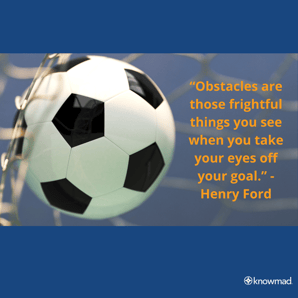As a marketing leader, you have a lot to balance between supporting sales, driving revenue, maintaining a brand image, trying to insert some much-needed creativity, and continually putting out fires. With so much to balance, it’s not uncommon that the to-do list you set out to accomplish today gets pushed back to tomorrow.
You know you are getting a lot done, but many marketing leaders have fallen into the trap of appearing effective without delivering. You want to see your company grow. You want to deliver results. But there’s just a lot to balance.
That’s why marketing leaders need to form daily and weekly habits. This ensures they are maintaining their effectiveness despite the numerous directions they are pulled. Implementing the 7 habits outlined below will ensure you are maintaining your effectiveness despite the numerous directions they are pulled.
1) Constantly learn horizontally and vertically
To be effective, you must implement a holistic digital marketing strategy that includes SEO, copywriting, web development, design, and much more. As a leader, it is important that you have a working knowledge of all the digital marketing disciplines.
PPC, SEO, ABM, CTA, KPI, SMM, UX, CRO, and ROI are just a few acronyms used in digital marketing conversations. A successful modern marketer knows and understands the width of this language, so they can actively engage in conversations with their team. The more you learn horizontally across the digital marketing disciplines, you can ask better questions to get the best results.
Effective marketers also dive deeply into their areas of strength and view their expertise as a never-ending pursuit. Learning vertically equips you to answer any questions you face and positions you as a thought leader on your subject of expertise. By truly becoming an expert at what you do, you can ensure you are providing the best approach and execution to your clients or company.
2) Set clear, measurable goals
For most marketing plans, the clear and measurable goal is revenue. When marketing works, revenue increases. Some marketing campaigns set out with a goal of raising awareness, invoking engagement, or something entirely different. No matter the end goal, it must be clear and it must be measurable.
Without a clearly defined goal, effectiveness can not be measured. As you build your marketing, clearly identify what your goal for the project is. Once you have identified the goal, add a number, and timeframe to it. This goal-setting approach not only helps you clarify the effectiveness of your marketing but also sets clear expectations for everyone involved.
3) Avoid moving the goal and changing the scope

Inevitably, something will slow the progress of your marketing initiative. When this happens, it's easy to move the goal or change the scope to make ourselves look better, but it’s actually not very helpful to do so. We all want to achieve our goals, but there are valuable lessons in embracing the conflict of our missed goals.
If the goal was missed due to error, you may need to reassess future estimates. If the campaign didn't go as planned, work to identify the source of the diversion. In both cases, there's an opportunity to identify areas in need of correction so you can work more effectively as a team.
Great marketers don’t move the goalposts, they embrace the lessons that come with failure and learn from them. Once you've determined a goal, stick to it. If you miss the goal, assess why, make changes, and move forward as a smarter marketer.
4) Regularly test new ideas in a manageable, measurable way
It's easy to fall into a "best practices" mindset. Sure, best practices are tried and true approaches, but often, they are also the same methods everyone else uses. Effective marketing sets your business apart from others, and new ideas help you stand out.
Highly effective marketers take the time to get creative and implement new ideas. It’s most effective to try new ideas first in an environment that is easy to control and measure. For example, you can test different subject lines in an email campaign to learn what kind of language gets more engagement from your ideal customers. You may find that a new way of communicating with your audience is actually more effective, which can lead to improved ad copy, website copy, and more!
5) Build easy-to-understand business cases for initiatives
Not every initiative has an end goal of increasing revenue. But whatever the goal, effective digital marketers build a case to illustrate the importance of the work and the expected results of the initiative, so everyone involved understands the investment of time, energy, and financial resources.
At the conclusion of an initiative or project, these business cases can easily be repurposed into a case study that details the outcome of the work.
6) Refuse to step over confusion or lack of clarity
Confusion and lack of clarity are roadblocks to progress. The easy way to get around these roadblocks is to step over them or step around them. But the reality is, if you are confused regarding a strategy, goal, or marketing message, it’s likely that others are also confused. Smart marketers understand that clarity is critical to success, and refuse to simply step over moments of confusion. By addressing confusion and lack of clarity head-on, you can keep your team on the same page and deliver more effective results.
7) Ruthlessly pursue meaningful data points
Effective marketing is backed by data. The really meaningful data doesn't always live on the surface, and you've got to dig to find the data that tells the whole story. Smart digital marketers use data to remove the guesswork of marketing, providing clear evidence for what works and what doesn’t.
The most important data point that marketers look to is revenue. Though revenue is the ultimate goal for most marketing, you must understand the whole story in order to replicate the success or avoid failure.
When you identify the specific data points that led to success or failure, you've identified a meaningful data point. To be a successful marketer today, you must relentlessly pursue the data that tells the whole story.
You are your habits
As mentioned before, you have a lot to balance. Luckily, balancing becomes significantly easier when you have a few easily repeatable and effective tasks to keep your mind and schedule organized.
Should you implement these seven habits, your effectiveness as a marketer will maintain, you will have more clarity and alignment internally, and your revenue will increase.
If you need help implementing these habits or help implementing effective digital marketing, we’re ready to help. Every one of our team members strives to implement these habits and deliver the highest quality results to our clients. Speak with a highly effective digital marketing from Knowmad today!

Diona Kidd
As Head of Operations, Diona focuses on building Knowmad into a more valuable business by creating clarity around what we sell, how we sell it, and how we fulfill our promises to clients.








